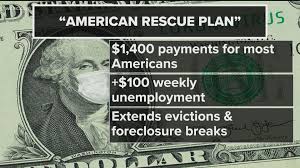The COVID-19 pandemic and the corresponding economic crisis have undermined the health and economic wellbeing of America’s workers. Millions of Americans, many of whom are people of color, immigrants, and low-wage workers, continue to put their lives on the line every day to keep the country functioning through the pandemic. And more than 9.5 million workers have lost their jobs in the wake of COVID-19, with 4 million out of work for half a year or longer. The American Rescue Plan Act supports workers by:

Improving the unemployment insurance system
Helps shore up and modernize the unemployment insurance system to help workers get the benefits they deserve when they need them.

Keeping workers safe
Provides additional funding for OSHA to help keep vulnerable workers healthy and safe from COVID-19

Assisting with health insurance premiums
Helps workers who lost their jobs or had their hours reduced during the pandemic pay for health insurance by fully subsidizing COBRA premiums for eligible individuals from April 1, 2021 through
Top 10 Takeaways:
Support for Students in Higher Education
The bill sets aside roughly $40 billion to support institutions and students in higher education, including additional emergency aid grants for students. The legislation also closes the 90-10 loophole by counting Department of Veterans Affairs and Department of Defense education assistance as federal funds for the purposes of the 90-10 rule, which provides a quality assurance check on proprietary institutions of higher learning. This eliminates the associated incentive for bad-actor proprietary schools to target student veterans and members of the military for their education benefits.
Additional Direct Stimulus Payments
Independent students, those not claimed as a dependent by someone else, who make up to $75,000 per year will receive direct stimulus payments of $1,400. Married couples making up to $150,000 per year would receive $2,800. Payments in lesser amounts will be disbursed to individuals and couples up to cut-off caps of $80,000 and $160,000 respectively. Eligible recipients will also receive $1,400 for each dependent.
Basic Needs Assistance
Approximately $20 billion is provided to defray rental costs for low-income households. Another $5 billion is set aside to address homelessness during the pandemic by providing vouchers to those who are currently homeless, at risk of homelessness, victims of domestic and sexual violence, and qualifying veterans specifically, among others.
Current foreclosure protections were extended until June 30th via an earlier Executive Order, and nearly $10 billion is set aside in this bill to help prevent foreclosures, mortgage delinquency, and utility loss.
The bill also includes $100 million for rural housing grants to those experiencing hardship.
The bill increases funding for the Low-Income Energy Assistance Program (LIHEAP) by $4.5 to provide additional aid to low-income households struggling with heating and cooling costs.
$880 million is set aside for Special Supplemental Nutrition Program for Women, Infants, and Children (WIC) program implementation and modernization and extends 15 percent increase to SNAP until September 2021.
Support for Healthcare Services
The bill provides 7.6 billion for community health centers and community care to carry out vaccine related activities. An additional $47.8 billion is dedicated to funding COVID-19 mitigation efforts like testing, diagnosing, and tracing infections. Additional funding is provided to support healthcare in several other areas such as the National Health Service Corps and Nurse Corps, rural healthcare assistance, and tribal health care programs, among others.
Boosts for Mental Health Supports
Over $3.5 billion appropriated for behavioral and mental health services and support.
Child Care Assistance
Roughly 39 billion is set aside to support childcare providers, agencies, and administration across the country. This includes nearly 15 billion in additional funding for the Child Care and Development Block Grant (CCDBG), which will be used to provide childcare for essential workers during the pandemic with no income level requirements.
Relatedly, the bill also increases the 2021 Child Tax Credit (CTC) to $3,000 for families with children under the age of 17 and $3600 for those with children under 6. Previous base-level income limitations have been removed, but income caps remain, the credit has been made entirely refundable, and associated refunds can be paid out monthly, throughout the year.
Help to Access Reliable Internet
Nearly 7 billion for technology investment for schools, including the ability to purchase the hardware, software, and connectivity products for students necessary to meet educational needs. In addition, a homeowner assistance fund is established to provide technology-specific financial assistance to homeowners who have experienced hardship due to COVID-19. Eligible homeowners may use this assistance to pay for internet service access and broadband internet services, among other things.
These are in addition to the Emergency Broadband Benefit Program established last December and approved late February by the FCC which provides a monthly stipend to low-income households to purchase internet connectivity and hardware.
Extended Unemployment Assistance
The bill extends many existing unemployment assistance provisions from the Coronavirus Aid, Relief, and Economic Security (CARES) Act and the Families First Coronavirus Response Act including Federal Pandemic Unemployment Compensation (FPUC) at $300 per week, Pandemic Unemployment Assistance (PUA), and Pandemic Emergency Unemployment Compensation (PEUC). It also extends Mixed Earner Unemployment Compensation (MEUC), which was established separately through the Consolidated Appropriations Act of 2021.
The American Rescue Plan Act extends these unemployment assistance programs through September 6, 2021. A brief explanation of each is provided below.
FPUC currently provides individuals with $300 in federal unemployment assistance in addition to what they are eligible to receive through state unemployment insurance.
PUA is available to those who are unable to qualify for normal unemployment insurance.
PEUC allows states to extend the number of weeks individuals can receive regular unemployment insurance.
MEUC provides unemployment assistance for independent contractors, freelancers, gig-workers and the self-employed.


